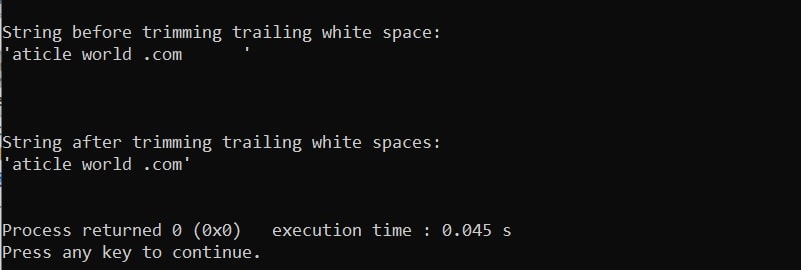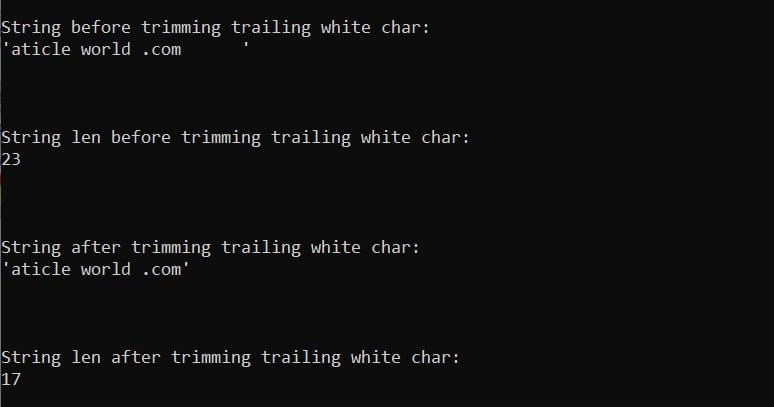In this blog post, you will learn how to write a C program to trim trailing white spaces from a string. How to remove both trailing white space characters in a string using loop in C programming. Also, logic to delete all trailing white space characters from a given string in C.
I will take the help of the isspace function to find the whitespace character within the given input string. So let’s see the C program to trim trailing white spaces from a string.
Examples:
Input String with trailing whitespace:> "aticle world .com " Output String:> "aticle world .com"
C program to trim trailing and trailing white spaces from a string:
Let’s some ways to trim trailing whitespace characters from the given input string. You can use it according to your use.
If you can modify the input string:
The below function returns a pointer to a substring of the original string. Also If the given string was allocated dynamically, the programmer should use the original pointer to deallocate the allocated memory. They must not be used the return pointer for deallocating the memory.
Method 1:
#include <ctype.h>
#include<string.h>
#include <stdio.h>
char *trimtrailingWhiteChar(char *str)
{
if ((str != NULL) && (*str != '\0'))
{
// Trim trailing space
char *end = str + strlen(str) - 1;
while(end > str && isspace((unsigned char)*end))
{
end--;
}
// Write new null terminator character
end[1] = '\0';
}
return str;
}
int main()
{
char str[] = "aticle world .com ";
printf("\nString before trimming trailing white space: \n'%s'\n\n", str);
char *p = trimtrailingWhiteChar(str);
printf("\n\nString after trimming trailing white spaces: \n'%s'\n\n", p);
return 0;
}
Output:

If you can not modify the input string:
This method is useful when you don’t want to modify the input string. In this method, we store the trimmed input string into the given output buffer, which must be large enough to store the result.
#include <ctype.h>
#include<string.h>
#include <stdio.h>
unsigned int trimwhitechar(char *outputBuffer, unsigned int givenStringLen, const char *str)
{
unsigned int outputBufferSize = 0;
if((str != NULL)
&& (givenStringLen > 0))
{
// Trim trailing space
const char *end = str + givenStringLen - 1;
while(end > str && isspace((unsigned char)*end))
{
end--;
}
end++;
// Set output size to minimum of trimmed string length and buffer size minus 1
outputBufferSize = ((end - str) < (givenStringLen-1)) ? (end - str) : givenStringLen-1;
// Copy trimmed string and add null terminator
memcpy(outputBuffer, str, outputBufferSize);
outputBuffer[outputBufferSize] = 0;
}
return outputBufferSize;
}
int main()
{
char str[] = "aticle world .com ";
const unsigned int gievenStringSize = strlen(str);
char outputBuffer[gievenStringSize];
printf("\nString before trimming trailing white char: \n'%s'\n\n", str);
printf("\n\nString len before trimming trailing white char: \n%d\n\n", gievenStringSize);
unsigned int lenSubString = trimwhitechar(outputBuffer,gievenStringSize,str);
printf("\n\nString after trimming trailing white char: \n'%s'\n\n", outputBuffer);
printf("\n\nString len after trimming trailing white char: \n%d\n\n", lenSubString);
return 0;
}
Output:

Recommended Post:
- trim leading whitespace character using the isspace in C.
- C program to trim leading and trailing white spaces from a string.
- Use of iscntrl function in C.
- How to use isalpha function in C programming?
- Use isalnum function in C programming?
- How to use isdigit function in C programming?
- How to use sizeof operator in C.
- _Alignof or alignof Operator in C.
- _Alignof or alignof Operator in C
- Alignment specifiers in C ( _Alignas).
- Function Specifiers in C.
- Type qualifiers in C.
- Punctuators in C.
- Elements of C language.
- C String Literals with Its Types
- C identifiers and naming rules.
- Stringizing operator (#) in C.